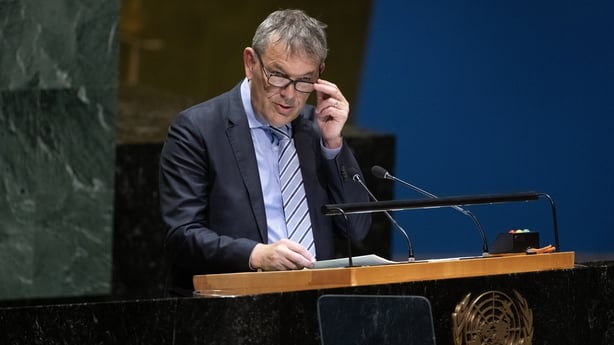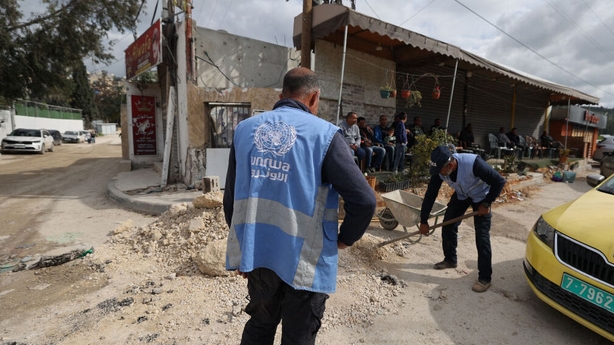An independent review of the UN's Palestinian refugee agency (UNRWA), set up after Israel alleged 12 UNRWA staff were involved in the 7 October attacks, has found that neutrality issues persist and has made recommendations to improve communication and oversight.
But on the specific allegations of complicity in the Hamas-led attacks, the report said that Israel had not provided the authors with evidence.
"Israel made public claims that a significant number of UNRWA employees are members of terrorist organizations," the report stated. "However, Israel has yet to provide supporting evidence of this."
The nine-week review was carried out by the former French foreign minister, Catherine Colonna, in conjunction with three research organisations, the Raoul Wallenberg Institute of Human Rights and Humanitarian Law in Sweden, the Chr Michelsen Institute in Norway, and the Danish Institute for Human Rights.
The authors of the final report, which has been published today, said UNRWA had established a robust framework of "mechanisms and procedures to ensure compliance with the Humanitarian Principles, with emphasis on the principle of neutrality" but that a number of "neutrality-related issues persist".
"They include instances of staff publicly expressing political views, host-country textbooks with problematic content being used in some UNRWA schools, and politicized staff unions making threats against UNRWA management and causing operational disruptions," the report stated.

UNRWA employs 32,000 people across the region, including some 13,000 in Gaza. The report stated that 99.2% of staff were locally recruited.
The review found that UNRWA had a robust framework to investigate breaches of neutrality but that it needed to improve, for example with regard to social media activity by staff members.
"Between January 2022 and February 2024, the Investigations Division received 151 neutrality-breach allegations," the report stated.
"Most alleged neutrality breaches relate to social media posts, made public by external sources. UNRWA has reviewed all external allegations of breaches of neutrality and opened investigations where it has found prima facie evidence of misconduct, representing around half of the allegations brought up," it said.
The report recommended improvements in the management of UNRWA, which the authors found had not sufficiently modernised.
"The ability to change and adjust must remain a high priority to ensure the organization can work effectively and efficiently, including to ensure neutrality," it said.
The report also found that UNRWA management responsibility to ensure their teams fully understand what is expected of them on neutrality "is neither articulated nor enforced".
On the question of school textbooks, which Israeli officials have long said contain anti-Semitic and extremist content, the report authors reviewed "three major international assessments and academic studies on the issue of Palestinian Authority textbooks".
"Two identified bias and non-compliant content but did not provide evidence of anti-Semitic reference," the report stated.
"A third, the Eckert report, identified two examples that displayed anti-Semitic content but noted that one had already been removed; the other has been significantly altered," it said.
Ms Colonna's report found that "3.85% of all textbook pages contain issues of concern to UN values, guidance, or UN positions on the conflict, either because they are deemed educationally inappropriate or because they are not in line with UNESCO standards".
"Even if marginal, these issues constitute a grave violation of neutrality," the report found.
"Among the various issues, recurrent ones were the use of historical maps in a non-historical context, e.g. without labelling Israel; naming Jerusalem as the capital of Palestine; naming cities in Israel as Palestinian cities; the use of the word Zionist (e.g "Zionist occupation" referring to Israel)," the report stated.
The review recommended stronger government structures for the agency including the establishment of an executive board.
UNRWA regularly shared staff lists with governments in the region, including Israel, the report found, and that "the Israeli Government has not informed UNRWA of any concerns relating to any UNRWA staff based on these staff lists since 2011".

But the report also found that UNRWA lacked the support of intelligence services to undertake efficient and comprehensive vetting.
Donors had also complained about a lack of transparency, according to the review.
"Donors expressed significant concerns over UNRWA's lack of communication and information-sharing.
This has focused not only on the agency’s neutrality issues but also on, for example, its budget and its financial state."
Following the allegations of complicity of 12 UN staff members in the Hamas-led attacks, 16 UN member states suspended or paused funding amounting to around $450 million (€422.8 million).
Some have since reinstated funding and others will decide whether to resume donations on the basis of today’s report.
A spokesperson for the Secretary General, António Guterres, said in a statement that Mr Guterres accepted the recommendations made in Ms Colonna’s report.
"He has agreed with Commissioner General Philippe Lazzarini that UNRWA, with the Secretary-General’s support, will establish an action plan to implement the recommendations contained in the Final Report," the statement said.
"In this regard, the Secretary-General counts on the cooperation of the donor community, the host countries and the staff to fully cooperate in the implementation of the recommendations," it said.







